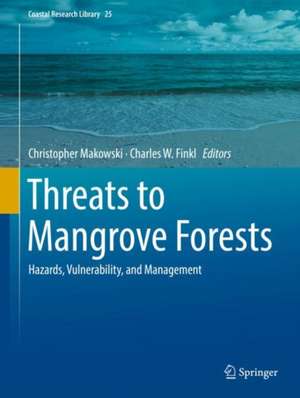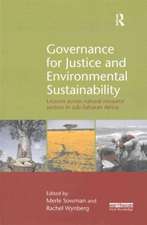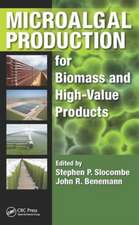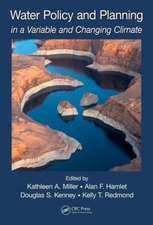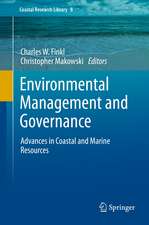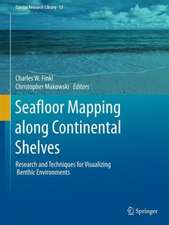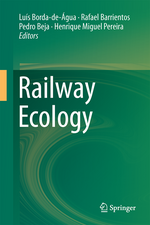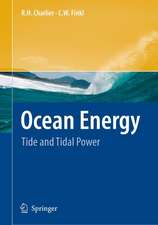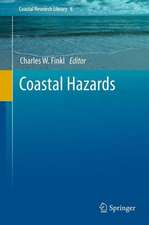Threats to Mangrove Forests: Hazards, Vulnerability, and Management: Coastal Research Library, cartea 25
Editat de Christopher Makowski, Charles W. Finklen Limba Engleză Hardback – 8 mai 2018
| Toate formatele și edițiile | Preț | Express |
|---|---|---|
| Paperback (1) | 1013.01 lei 38-45 zile | |
| Springer International Publishing – 4 ian 2019 | 1013.01 lei 38-45 zile | |
| Hardback (1) | 1377.42 lei 38-45 zile | |
| Springer International Publishing – 8 mai 2018 | 1377.42 lei 38-45 zile |
Din seria Coastal Research Library
- 18%
 Preț: 809.07 lei
Preț: 809.07 lei - 15%
 Preț: 646.62 lei
Preț: 646.62 lei - 15%
 Preț: 654.12 lei
Preț: 654.12 lei - 18%
 Preț: 968.65 lei
Preț: 968.65 lei - 18%
 Preț: 1249.93 lei
Preț: 1249.93 lei -
 Preț: 395.47 lei
Preț: 395.47 lei - 20%
 Preț: 757.62 lei
Preț: 757.62 lei - 18%
 Preț: 1417.72 lei
Preț: 1417.72 lei - 18%
 Preț: 726.37 lei
Preț: 726.37 lei - 18%
 Preț: 971.01 lei
Preț: 971.01 lei - 18%
 Preț: 985.24 lei
Preț: 985.24 lei - 15%
 Preț: 641.71 lei
Preț: 641.71 lei - 15%
 Preț: 644.30 lei
Preț: 644.30 lei - 15%
 Preț: 643.84 lei
Preț: 643.84 lei - 15%
 Preț: 649.54 lei
Preț: 649.54 lei - 20%
 Preț: 572.09 lei
Preț: 572.09 lei - 24%
 Preț: 809.95 lei
Preț: 809.95 lei - 24%
 Preț: 698.82 lei
Preț: 698.82 lei - 24%
 Preț: 840.68 lei
Preț: 840.68 lei - 24%
 Preț: 825.72 lei
Preț: 825.72 lei - 24%
 Preț: 1257.51 lei
Preț: 1257.51 lei - 24%
 Preț: 819.29 lei
Preț: 819.29 lei - 24%
 Preț: 1518.91 lei
Preț: 1518.91 lei - 20%
 Preț: 608.36 lei
Preț: 608.36 lei - 24%
 Preț: 763.00 lei
Preț: 763.00 lei - 15%
 Preț: 699.28 lei
Preț: 699.28 lei - 20%
 Preț: 624.69 lei
Preț: 624.69 lei -
 Preț: 400.03 lei
Preț: 400.03 lei - 20%
 Preț: 552.37 lei
Preț: 552.37 lei - 24%
 Preț: 671.00 lei
Preț: 671.00 lei -
 Preț: 412.27 lei
Preț: 412.27 lei
Preț: 1377.42 lei
Preț vechi: 1788.86 lei
-23% Nou
Puncte Express: 2066
Preț estimativ în valută:
263.56€ • 276.66$ • 218.77£
263.56€ • 276.66$ • 218.77£
Carte tipărită la comandă
Livrare economică 07-14 aprilie
Preluare comenzi: 021 569.72.76
Specificații
ISBN-13: 9783319730158
ISBN-10: 3319730150
Pagini: 460
Ilustrații: XIII, 724 p. 431 illus., 335 illus. in color.
Dimensiuni: 210 x 279 x 41 mm
Greutate: 2.18 kg
Ediția:1st ed. 2018
Editura: Springer International Publishing
Colecția Springer
Seria Coastal Research Library
Locul publicării:Cham, Switzerland
ISBN-10: 3319730150
Pagini: 460
Ilustrații: XIII, 724 p. 431 illus., 335 illus. in color.
Dimensiuni: 210 x 279 x 41 mm
Greutate: 2.18 kg
Ediția:1st ed. 2018
Editura: Springer International Publishing
Colecția Springer
Seria Coastal Research Library
Locul publicării:Cham, Switzerland
Cuprins
1. Status and Management Efforts of Mangrove Habitats in South Florida.- 2. Threats on biodiversity and management challenges for the Sundarbans mangrove forest of Bangladesh.- 3. Conservation in Mangrove Forests of Northeast Brazil, investigated through the diversity of Drosophilidae.- 4. Blue carbon potential of community-managed mangrove forests.- 5. The (beneficial) effects of mangrove forest to sea defence structures.- 6. Mangrove species composition change over the last 50 years in Bangladesh and associated threats to the Sundarbans.- 7. Towards sustainability and protection of threatened coastal ecossystems: Management strategies for a rare stone mangrove in Gorda Beach, Buzios, Brazil.- 8.Natural and human-induced impacts on the Isla Salamanca Natural Park, Caribbean Coast of Colombia.- 9. An analysis of mangrove establishment in an artificial estuarine channel, Singapore.- 10. Vulnerability of Mangrove Forest Wetland Ecosystems in The Sundarbans Natural World Heritage Site of Bangladesh.- 11. Assessment and Management strategies of Mangrove Forest in Brunei Darussalam on the island of Borneo.- 12. The transitional mangrove scrub north of La Paz and Magdalena Bay in Baja California Sur.- 13. TBD (Current status of mangrove wetlands in Sinaloa, a biological corridor along the eastern margin of the Gulf of California).- 14. TBD (Interaction of mangroves, coastal hydrodyanmlics and morphodynmics of the mangrove fringe along the coasts of Guiane francaise, Suriname and Guyana).- 15. Mangrove Forests threatened in different Physiographic settings: some critical issues of natural impacts on the coastal fringing forests of India.- 16. TBD (The 'state-of-play' in Australia wherein mangroves are being destroyed or compromised anthropogenically).- 17. TBD (Legislation side of mangrove protection in Australia).- 18. Physical oceanography processes affecting tropical mangroves and their numerical parameterisations.- 19. Managing mangrove expansion in New Zealand - Erik Horstman et al.- 20. Heavy metal distribution and accumulation from natural and anthropogenic sources in tropical mangroves of India and Bangladesh.- 21. TBD (mangroves on the Brazilian Amazon coast regarding uses and restoration).- 22. Mangrove forests in São Tomé and Príncipe Islands (Gulf of Guinea, Africa): Conservation and Management Status.- 23. High-Throughput Techniques as Tools for Knowledge-Based Spatial Conservation Prioritization in Mangrove Ecosystems.- 24. Ecosystem Design: When mangrove ecology meets human needs.- 25. TBD (Urban Mangroves).- 26. Geospatial assessment of spatio-temporal changes in mangrove vegetation of Pichavaram region, Tamilnadu, India.- 27. Remote Sensing of Mangrove Forests: Current Techniques and Existing Datasets (or Databases).- 28. TBD (Mangrove Forest Persian and Oman Gulf).- 29. Challenges and Opportunities for Establishment of Mangrove Plantations in the Arabian Gulf Region.- 30. Impacts of urbanization on organic matter production within river-mangrove estuary systems: Examples from the Cocó and Pacoti Rivers, Ceará State, Brazil.- 31. Urban Mangrove Biology and Ecology.
Notă biografică
Christopher Makowski is the Assistant Director of the Coastal Education and Research Foundation, Inc. (CERF) and the Deputy Editor-in-Chief of the international Journal of Coastal Research (JCR). He has published numerous peer reviewed papers, authored several chapters, and co-edited and/or contributed to various volumes in Springer's Coastal Research Library (CRL) Series. In addition to these accomplishments, he is professionally recognized by the American Academy of Underwater Sciences (AAUS), served as the Assistant Director of the Marine Science and Biological Research Division at the coastal engineering firm, Coastal Planning & Engineering (CPE), and held the position of Principle Marine Scientist for the municipality of Collier County, Florida, U.S.A. He is a graduate of Florida Atlantic University and has earned degrees with an emphasis on remote sensing of biogeomorphological resources (Ph.D.) and marine ecosystem diversity and conservation (Master’s of Science). In addition to his academic and professional credentials, Dr. Makowski is also a certified Master Scuba Diver Trainer through the Professional Association of Diving Instructors (PADI). Other professional registrations and certifications include: Journal of Coastal Research (JCR) Editorial Board Member, The International Society for Reef Studies (ISRS) Sustaining Member, The Florida Association of Environmental Professionals (FAEP) Chapter Member, American Academy of Underwater Sciences (AAUS) Registered Diving Safety Officer, American Association for the Advancement of Science (AAAS) Member, Coastal Education and Research Foundation (CERF) Board of Directors (Trustees), National Marine Fisheries Service (NMFS) Certified Marine Mammal and Protected Species Observer, Professional Association of Diving Instructors (PADI) Open Water Scuba Diver Instructor, PADI Enriched Air Nitrox Specialty Instructor, Emergency First Responder (CPR/FirstAid/AED) Instructor, PADI Specialty Underwater Photographer Instructor, and Divers Alert Network (DAN) Professional Member.
Charles W. Finkl has been the Executive Director of the Coastal Education & Research Foundation and Editor-in-Chief of the international Journal of Coastal Research for the past 35 years. He has edited and/or contributed to more than eight volumes in the Encyclopedia of Earth Sciences Series (Springer), of which he is the Series Editor. He is also the Series Editor of the Coastal Research Library (Springer). In addition to these duties, he is Distinguished University Professor Emeritus at Florida Atlantic University (FAU) (Boca Raton, Florida). He is a graduate of Oregon State University (Corvallis) and the University of Western Australia (Perth). Work experience includes the International Nickel Company of Australia (Perth), Coastal Planning & Engineering (Boca Raton, Florida), and Technos Geophyiscal Consulting (Miami, Florida). He has published numerous peer-reviewed technical research papers, and edited or co-edited and contributed to many books. Dr. Finkl is a Certified Professional Geological Scientist (Arvada, Colorado), a Certified Professional Soil Scientist (Madison, Wisconsin), a Certified Wetland Scientist (Lawrence, Kansas), and a Chartered Marine Scientist (London). Academically, he served as a Demonstrator at the University of Western Australia, Courtesy Professor at Florida International University (Miami), Program Professor and Director of the Institute of Coastal and Marine Studies at Nova Southeastern University (Port Everglades, Florida), and Full Professor at FAU. During his career, he acquired field experience in Australia; the Bahamas; Puerto Rico, Jamaica; Brazil; Papua New Guinea and other SW Pacific islands; southern Africa; Western Europe; and the Pacific Northwest, Midwest, and Southeast USA. Dr. Finkl is a member of several professional societies including the Geological Society of America; Soil Science Society of America; Institute of Marine Engineering, Science & Technology; and the Society of Wetland Specialists. He is a recipient of the International Beach Advocacy Award (Florida Shore & Beach Preservation Association), Certificate of George V. Chilingar Medal of Honor (Russian Academy of Natural Sciences), and Lifetime Commitment to Coastal Science Award (International Coastal Symposium).
Charles W. Finkl has been the Executive Director of the Coastal Education & Research Foundation and Editor-in-Chief of the international Journal of Coastal Research for the past 35 years. He has edited and/or contributed to more than eight volumes in the Encyclopedia of Earth Sciences Series (Springer), of which he is the Series Editor. He is also the Series Editor of the Coastal Research Library (Springer). In addition to these duties, he is Distinguished University Professor Emeritus at Florida Atlantic University (FAU) (Boca Raton, Florida). He is a graduate of Oregon State University (Corvallis) and the University of Western Australia (Perth). Work experience includes the International Nickel Company of Australia (Perth), Coastal Planning & Engineering (Boca Raton, Florida), and Technos Geophyiscal Consulting (Miami, Florida). He has published numerous peer-reviewed technical research papers, and edited or co-edited and contributed to many books. Dr. Finkl is a Certified Professional Geological Scientist (Arvada, Colorado), a Certified Professional Soil Scientist (Madison, Wisconsin), a Certified Wetland Scientist (Lawrence, Kansas), and a Chartered Marine Scientist (London). Academically, he served as a Demonstrator at the University of Western Australia, Courtesy Professor at Florida International University (Miami), Program Professor and Director of the Institute of Coastal and Marine Studies at Nova Southeastern University (Port Everglades, Florida), and Full Professor at FAU. During his career, he acquired field experience in Australia; the Bahamas; Puerto Rico, Jamaica; Brazil; Papua New Guinea and other SW Pacific islands; southern Africa; Western Europe; and the Pacific Northwest, Midwest, and Southeast USA. Dr. Finkl is a member of several professional societies including the Geological Society of America; Soil Science Society of America; Institute of Marine Engineering, Science & Technology; and the Society of Wetland Specialists. He is a recipient of the International Beach Advocacy Award (Florida Shore & Beach Preservation Association), Certificate of George V. Chilingar Medal of Honor (Russian Academy of Natural Sciences), and Lifetime Commitment to Coastal Science Award (International Coastal Symposium).
Textul de pe ultima copertă
This book focuses on the worldwide threats to mangrove forests and the management solutions currently being used to counteract those hazards. Designed for the professional or specialist in marine science, coastal zone management, biology, and related disciplines, this work will appeal to those not only working to protect mangrove forests, but also the surrounding coastal areas of all types. Examples are drawn from many different geographic areas, including North and South America, India, and Southeast Asia. Subject areas covered include both human-induced and natural impacts to mangroves, intended or otherwise, as well as the efforts being made by coastal researchers to promote restoration of these coastal fringing forests.
Caracteristici
Offers a unique fusion of marine science, coastal zone management, biology, and history Contains a rich source of unpublished data, case studies, and illustrations Provides informative and interpretive views of mangrove forests and adjacent coastal environments Focuses on innovative management tools being used in coastal marine areas throughout the world Supplies a historical context to scientific, technical, and managerial decision making
